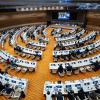Media
Around 3.6 billion people live in contexts that are highly vulnerable to climate change and many of them are in transboundary basins. Droughts do not recognize borders, pose transboundary risks, and require cooperation to address them. The 6th IPCC assessment (2022) and the IPCC synthesis (2023)…
The global market for second-hand clothing has been multiplied by seven in the last 4 decades. The practice of exporting second-hand clothing from developed to developing countries has been intensified by the boost of the fast fashion industry, impacting the environment, social and human rights in…
With less than 7 years remaining to achieve the 2030 Agenda for Sustainable Development and its Sustainable Development Goals (SDGs), the implementation of these ambitious goals is in peril. Progress is insufficient in many key areas and further affected by multiple crises, as pointed out in UNECE’…
The COVID-19 pandemic and the regional conflicts have negatively affected economic development in Eastern Europe and the South Caucasus (EESC), significantly disrupting international trade, investment and cooperation. To achieve a resilient recovery and support the transition to knowledge-based and…
Four years ago, when the COVID-19 pandemic hit, it disrupted the normal functioning of open markets. The ensuing crisis had crippling effects on global trade and productive capacities: it broke supply chains, reduced connectivity and slowed the flow of essential goods. Global food and energy…
The raw materials sector is at the forefront of global challenges and opportunities of the 21st century, as it plays a vital role in the energy, transport, and digital transitions required to mitigate and adapt to climate change. However, the sector also faces significant pressures from consumers,…
The impact of different air pollutants on vegetation and crops has been studied for over 35 years in the framework of the UNECE Convention on Long-range Transboundary Air Pollution, through its International Cooperative Programme on Effects of Air Pollution on Natural Vegetation and Crops (ICP…
In recent years, Montenegro and its capital city, Podgorica, have been committed to accelerate sustainable and smart urban development through a variety of ambitious national and regional and local measures, such as digitalization of public services, modernization of public transport, and to…
The Sustainable Development Goals (SDGs) require a massive transformation of our economies and societies, and a shift towards more sustainable patterns of production and consumption. Public-Private Partnerships (PPPs) are a powerful tool to support this transformation, as they can mobilise private…
Would you trust artificial intelligence (AI) in your heart? This is not some imaginary, science-fiction scenario. Biomedical companies are already developing pacemakers embedded with AI. Digital technologies like AI are also opening new possibilities such as improved management of natural resources…











